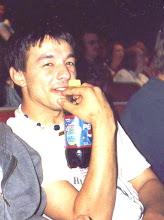Locking Up Parents, Damaging Children (New Book)
Title:
All Alone in the World: Children of the Incarcerated
Author:Nell Bernstein
Publisher:The New Press
Copyright:2005
ISBN:1565849523
Pages:288
Synopsis:
Many of the incarcerated men and women in this country are parents. Their children pay a high price – and with almost two-and-a-half million children experiencing the loss of a parent to the criminal justice system, it’s a price that is also paid by schools, neighborhoods, and extended families. Journalist Nell Bernstein’s book, All Alone in the World, takes a close and compassionate look at families affected by incarceration. CFK Editor Susan Phillips has this review.
Review:
The unprecedented expansion of the prison population in the U.S. over the last 30 years, driven largely by changes in the way the law treats drug users and drug sellers, has had profound effects on millions of people who have never committed a crime: the children of prisoners, of course – but also their siblings and other family members, friends and neighbors.
Nell Bernstein’s book, All Alone in the World, offers us valuable insight into the destructive effect this wholesale incarceration of parents is having on children, extended families, and entire communities.
Bernstein effectively uses the personal stories of prisoners, their children, and their families to make real what research tells us about the toxic effects of parental incarceration on children: high rates of anxiety and attention disorders and post traumatic stress; unstable living arrangements with a variety of overstressed caregivers; struggles with school performance and school behavior; increased poverty.
With 2.4 million children currently experiencing the incarceration of a parent, and more than 7 million with a parent under criminal justice supervision, the problems of this group are problems our entire society needs to address. One of the bleakest statistics in the book is that as many as fifty percent of boys who experience a parent’s incarceration will wind up behind bars themselves.
And because of mandatory sentencing laws, the loss of a parent can extend for years, decades, even lifetimes. In her chapter on the effect of these sentencing policies, Bernstein describes the case of a woman arrested on drug charges. A first offender, but prosecuted under a law designed to nab drug “kingpins”, Danielle was given a sentence of three consecutive life terms. “I didn’t even think it was real at the time,” her son Carl told Bernstein. “I thought she was kidding. I remember saying, ‘You can’t do triple life. You only have one.’”
Bernstein argues that mandatory sentencing laws have had a disproportionate effect on women, who are now the fastest-growing segment of the prison population. Her recounting of Danielle’s efforts to parent her son from behind bars is painful to read; Carl’s hope of winning her release by becoming a famous rap star who can afford the best lawyers is heartbreaking.
All Alone in the World also highlights the stunning inattention of our major public institutions to the needs of these children. Police making a drug bust aren’t usually expected to ask or care if they are snapping the cuffs on the primary caregiver of one or more young children. Child welfare agencies are not routinely informed when parents are taken to jail. Legitimate privacy concerns stand in the way of routinely informing schools and teachers of a parent’s arrest and incarceration – yet this could be valuable information if schools want to respond appropriately and with sensitivity to the acting out that often follows.
As Bernstein notes in her introduction, no one is claiming that the parents in question are great, good, or even adequate parents. But losing them still hurts their children. “But in one way are another, most say the same thing: things were hard. Mom got arrested. Things got worse.”
Bernstein’s first chapter, Arrest, starts off with 10-year-old Anthony remembering when his meth-abusing mother and her boyfriend, who also cooked and sold meth in a shed, were arrested. Police broke down the door, smashed through the floorboards of the house, broke a lot of things. He was put in the back of a police car and taken to a shelter. “It’s kiddie jail,” Anthony recalls. “They keep you in cells—little rooms that you sleep in, and you have nothing except for a bed, blankets and sheets. You couldn’t even go to the bathroom in the middle of the night.”
Anthony’s grandmother tried to get him out of the shelter, but he wasn’t released to her care for two and a half weeks, because she lived in a different county and child welfare authorities insisted she find housing in the county first.
See more on this book at: http://www.connectforkids.org/node/4349


2 Comments:
Parents who use meth don't deserve their children. Yes, it is bad to be taken by the police in the middle of the night to foster care. But, what if the house blew up while they were manufacturing and the children burnt to death. What if they are abused by their parent's friends while they are crashed out? What if they go a week or two without food? What if they parent's give the kid's meth turning them into addicts when they are a little bit older? Then, everyone will say "Why didn't the police step in and do something? Why didn't they take the kids away?" Give me a break.
taking these parents is mch better than leaving them to die. their parents need to get off drugs and be mothers and fathers. this book is a load of hooey!
Post a Comment
Subscribe to Post Comments [Atom]
<< Home